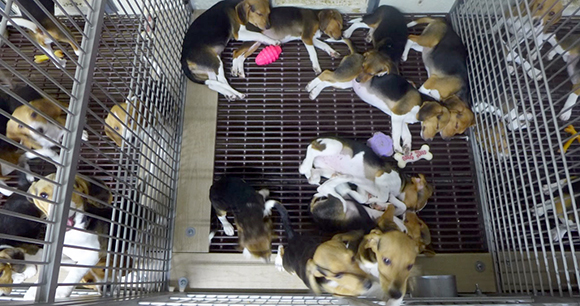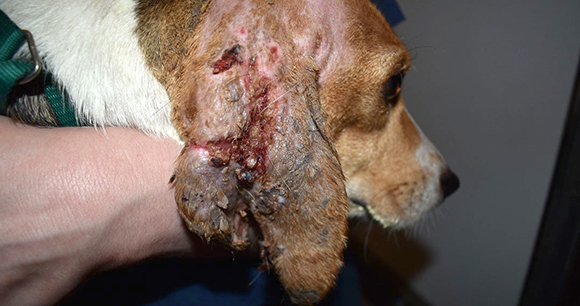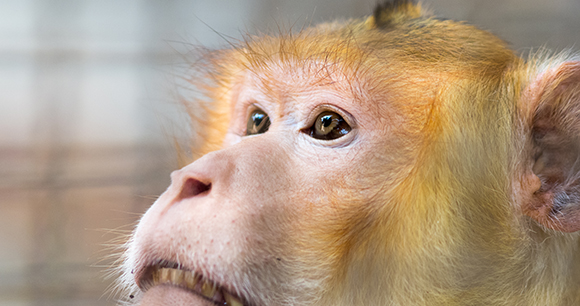“Beagle production facility.”
That’s how John Sagartz, chief strategy officer for Inotiv (the company that purchased Envigo last November) repeatedly described its Cumberland, Virginia, dog-breeding operation during a June 2022 hearing concerning conditions at the facility. Sagartz went on to say that 25 percent of the “domestic supply” of beagles for research was provided by what his declaration called the company’s “animal production facility focused on the generation of beagle dogs.” His language evokes images of a factory assembly line. Dogs here are not born and raised—rather, the “product” is “generated.”

The hearing was triggered by a complaint for injunctive relief filed by the US Department of Justice. The complaint was filed May 19, 2022, one day after the DOJ, in coordination with the Commonwealth of Virginia, began executing a search warrant at the facility, from which they ultimately seized 446 dogs deemed by veterinarians to be in “acute distress.” After the hearing, the parties reached a settlement and the court entered a consent decree whereby Inotiv must shutter the facility and surrender approximately 4,000 dogs for adoption.
Such a seizure and settlement involving one of the world’s largest research suppliers is historic. However, it should never have come to this. The abject failure on the part of the US Department of Agriculture’s Animal and Plant Health Inspection Service (APHIS) to act—after documenting unconscionable suffering at the facility for months—cries out for systemic change and accountability.
Among the worst AWI has ever seen
On July 20, 2021—nearly a year before the settlement—inspectors at the Cumberland facility documented seven “direct” citations and three additional “critical” citations regarding fundamental animal welfare requirements such as veterinary care, staffing, housing, sanitation, records, and feeding. Critical citations involve situations adversely affecting an animal’s health and well-being, with direct citations being the most severe type. Ten critical citations, including seven direct citations, in one inspection is hard to fathom—indicative of truly abysmal conditions. AWI told Science magazine, in fact, that the scope of suffering at Cumberland was “almost beyond words.”
Among the findings, inspectors documented Envigo’s failure to determine the cause of death for over 300 puppies who had perished since January 2021, including 173 so decomposed it was no longer possible to determine cause of death—information vital to ensuring the health of survivors. The inspection report also chronicled deficient staffing, with approximately 128 dogs per employee and a single full-time veterinarian for over 5,000 dogs at the site.

A concurrent inspection of an Envigo research site in Virginia produced additional critical citations, including for refusing to provide full study records despite repeated requests by inspectors, who wrote that this made it impossible to fully ascertain Animal Welfare Act (AWA) compliance. Out of over 10,000 research facility inspections since 2014, Envigo is the only entity to receive a critical citation for failure to provide such records.
APHIS blatantly violates 14-day reinspection mandate
APHIS’s Animal Welfare Inspection Guide states that a single direct citation “must” [emphasis in original] be reinspected within 14 days—regardless of appeals (which Envigo filed multiple times). Here, seven direct citations spoke to horrendous suffering dating back at least seven months. Yet APHIS waited over three months to reinspect—not returning until October 25.
Once it did return, it found similar conditions. The report documented seven critical citations—six of them direct—and stated that “there continue to be severe staffing shortages.” In fact, despite Envigo’s $291.7 million in revenue in 2021, staffing at Cumberland had actually decreased—from approximately one employee per 128 dogs to one per 154, and still only one full-time veterinarian. (Tellingly, the report used the words “still” or “continue(s)” 15 times.)
Three weeks later, on November 16, another inspection occurred, and it was worse than the two prior. Inspectors documented 12 non-critical citations and an unbelievable 14 direct citations—exceeding the total number of directs from the previous two combined. For perspective: From 2014 to 2021, notorious chinchilla dealer Daniel Moulton racked up 51 direct citations, more than any of the other 10,000+ AWA licensees and registrants during that time. (See AWI Quarterly, winter 2021.) In three inspections over five months, Envigo collected 27—more than half the number of direct citations Moulton amassed in almost eight years.
And yet, after this truly disastrous November inspection, APHIS waited nearly another four months, until March 8, 2022, to reinspect Envigo. In this inspection, a scant 79 dogs (less than 2 percent of Envigo’s population in November) were observed. Inspectors still encountered conditions bad enough to merit two more direct citations, including the widespread use of slatted floors, which Envigo had been previously warned were “especially dangerous.” Indeed, inspectors repeatedly witnessed multiple dogs “actively stuck.”
APHIS unmoved by uproar, atrocities
The situation at Cumberland was explosive enough to spark international media attention, demands for action from members of Congress of both parties, and legislative action in the Commonwealth of Virginia aimed at preventing such a fiasco in the future. This did not appear to faze APHIS, which not only repeatedly ignored the 14-day reinspection mandate from its own inspection guide, but also failed to take a single enforcement action: It did not file an administrative complaint, did not suspend the breeder license, did not even issue a warning letter. It did not confiscate a single dog and did not refer the case to the DOJ for injunctive relief. The AWA mandates that if APHIS has reason to believe that an entity is placing the health of animals in serious danger (obviously the case here) it must refer the matter to the DOJ.
As badly as APHIS bungled a case last year involving similar systemic issues against dog-breeder Daniel Gingerich (it failed to confiscate suffering dogs and only referred the case to the DOJ after an inexcusable delay—see AWI Quarterly, winter 2021), the agency at least made some effort then to uphold the 14-day reinspection mandate. From July 7 to October 13, 2021—even as it refused to reinspect Envigo—APHIS conducted 18 inspections at four Gingerich sites, with the vast majority of reinspections that followed direct citations occurring within 14 days. In the end, Gingerich surrendered over 500 dogs and had his license permanently revoked. Indeed, APHIS permanently revoked both Gingerich’s and Moulton’s licenses. But, of course, neither of these abhorrent abusers come close to Envigo’s wealth, size, or power.
After a May 3, 2022, inspection by APHIS documenting just one citation—dogs once again “actively stuck” in slatted floors—the DOJ, supported by Virginia, began executing a search warrant on May 18. They found conditions so awful they felt the need to rescue 446 of the dogs. Among the numerous atrocities revealed: A dead puppy had been discovered not long before with only a head remaining. The rest had been eaten.
How many dogs suffered or died behind Envigo’s closed doors because APHIS refused to act? Indeed, even weeks after the seizure, an investigator from the Virginia Attorney General’s Animal Law Unit who assisted with the raid documented continued fundamental issues with food, water, sanitation, enclosures, and veterinary care.
Envigo, Inotiv turn on gaslights
Meanwhile, Envigo was trying desperately to redirect the narrative. In November 2021, the company publicly touted $3 million spent on improvements over the past five years and asserted it “immediately began to address [APHIS’s] concerns,” was taking “the necessary corrective actions for all issues,” and “do[es] not neglect our animals,” adding, for good measure, “the highest quality of animal welfare is a core value of our company.”

In March of this year, Envigo downplayed the release of video from the July 2021 inspection, stating, “The story is not new,” and it was “taking the necessary actions to address those issues.” Just days before the May 2022 raid commenced, Envigo told National Geographic the company was aware of a recent inspection that “essentially repeats earlier findings, all of which are being addressed.”
The gaslighting continued at the June hearing, at which the chief strategy officer of Inotiv testified. Even after APHIS had repeatedly and egregiously delayed inspection and failed to take any enforcement action, Inotiv had the gall to complain about regulatory scrutiny. It also proposed selling thousands of dogs—through the same subsidiary that had refused to disclose full study records—by prefilling contracts with delivery dates as late as July 2023, potentially keeping dogs longer in this execrable facility. Inotiv claimed it takes AWA compliance seriously and was making improvements, and sought to deflect blame by reminding the court it had taken control of the Cumberland facility only six months prior—ignoring the fact that the horrors continued on Inotiv’s watch, as well as the extent to which Envigo—in both actions and actors—is entwined with Inotiv.
In a February 2022 presentation to investors, three of eight individuals touted as Inotiv’s “Accomplished Senior Leadership” are Envigo holdovers, including Executive Vice President Adrian Hardy, who had been Envigo’s CEO since 2002. That presentation also underscored Envigo’s financial significance to Inotiv: Inotiv’s Research Models and Services (RMS) division accounts for 74 percent of its revenue, and the vast majority of its RMS business comes from Envigo. In contrast, a May investor call reported zero RMS revenue for Inotiv the prior year, before the Envigo acquisition.
Inotiv expands, acquires other troubled sites
In addition to Envigo holdovers, Inotiv has hired key staff from notorious lab animal suppliers SNBL USA and Covance. In 2016, SNBL, which owned a monkey site in Alice, Texas, was hit with a $185,000 fine and had its dealer license suspended for acts that included the negligence-induced deaths of 25 of 840 crab-eating macaques imported from Asia. That same year, Covance, which owned two other monkey facilities in Alice, was assessed a $31,500 fine for incidents involving 13 overheating deaths of crab-eating macaques and failing to provide water and air conditioning for five others who suffered distress during transport from the airport.
Inotiv has since run afoul of the AWA with respect to its own macaques. A May 2022 inspection of an Inotiv lab in Mount Vernon, Indiana, resulted in a critical citation over multiple deaths of crab-eating macaques in primate restraint chairs. Inspectors also found other issues. In 2021, this lab used 750 monkeys.

Meanwhile, despite the grave issues at Cumberland, Inotiv’s expansion continues. In addition to a number of sites housing untold numbers of rodents, it has purchased Robinson Services (thereby expanding its rabbit total to 30,000) and monkey dealer Orient BioResource, which took over SNBL’s Alice, Texas, site. The other two Alice monkey sites, previously owned by Covance, were acquired by Envigo in June 2019—meaning Inotiv now owns all three sites. The most recent inspection inventories of the sites show a combined total of 6,388 crab-eating macaques and 2,784 rhesus macaques.
Animals deserve federal protector, not industry enabler
It is extremely fortunate that the DOJ and Virginia stepped in and rescued these 4,000 dogs, but frustrating beyond measure that APHIS’s inaction has constrained the scope of the available remedy. Because APHIS declined to take enforcement action, the July 14 settlement does not include license revocation. If any company ever earned permanent license revocation, it is Envigo.
Now the question becomes—what will protect the over 50,000 animals at Inotiv’s other sites? Given Inotiv’s focus on expansion, its disregard for the AWA, and APHIS’s failure to act, what prevents this company from reconstituting its dog breeding business—and its 25 percent market share—in a jurisdiction less enlightened than Virginia?
Researchers who purchase Inotiv’s “product” perpetuate a business linked to the unconscionable mistreatment of a multitude of dogs, which is not only inhumane but also, we believe, raises significant questions about the value of the resulting “science.” AWI urges them to think long and hard before buying from a company that shows so little regard for the animals under its control.
We urge everyone to write Secretary of Agriculture Tom Vilsack to express your outrage at the USDA’s failure to enforce the AWA and swiftly come to the rescue of thousands of dogs enduring unimaginably grim conditions. You can reach the secretary at the following address: The Honorable Tom Vilsack, Secretary, US Department of Agriculture, 1400 Independence Avenue SW, Washington, DC 20250.